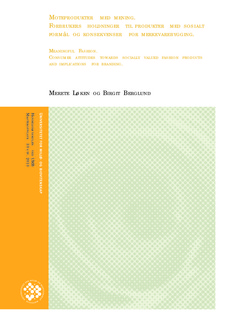| dc.description.abstract | Oppstartsbedriften WayaWaya ønsker å etablere seg som norsk merkevare. Konseptet baseres
på en systue i Zambia hvor det ansettes vanskeligstilte kvinner. WayaWaya ønsker bevisst å
framheve det sosiale formålet og ønsker å bruke denne studien som bakgrunn for videre
posisjonering og utvikling av merkevaren. Vi har valgt relevant teori og
bakgrunnsinformasjon om motebransje, etisk produksjon, sosial verdi, forbrukeratferd og
merkevarebygging i forhold til problemstilling og tilhørende delspørsmål.
Vi valgte et fenomenologisk forskningsdesign hvor hensikten var å finne ut mer om
målgruppens assosiasjoner og holdninger til et sosial formål bak et moteprodukt, mer spesifikt
moteprodukter/vesker. Vi gjennomførte tre fokusgrupper med i alt 14 deltakere. Vi ønsker å
forstå vår potensielle kundegruppe og hvilket forhold de har til produkter med et sosialt
formål, og hvor viktig dette formålet er for deres kjøpsintensjoner.
Respondentene i vår studie har generelt negative holdninger til produksjon i motebransjen og
assosierer det med uetiske arbeidsforhold. De ønsker større åpenhet rundt verdikjede og
trekker frem forretningsmodellen til WW som et inspirerende eksempel. For at WW skal
oppnå suksess er det viktig at historiefortelling og fokus på design/kvalitet blir kommunisert
på en balansert måte. Studien viser videre at det sosiale formålet ikke kan bære produktet
alene, men kan bidra til å bygge en sterk merkeverdi. Ved undersøkelse av hvilke
produktattributter som vektlegges, fant vi ut at det viktigste og mest avgjørende for å kunne
slå igjennom i motebransjen er designet. Når det gjelder fordeler, er de symbolske fordelene
tydelig viktig for forbruker når det gjelder motevesker. En dypere, følelsesmessig dimensjon
som underbygger deres identitet og gruppetilhørighet viste seg å være avgjørende for valg i en
kjøpssituasjon, spesielt om man kan velge mellom to tilnærmet like produkter.
Ved formuleringen av selve merkevarestrategien benyttet vi Urdes arbeidsmodell for
merkevareorienterte bedrifter. Vi tok utgangspunkt i WayaWaya’s verdigrunnlag/personlighet
og dannet en plattform for hvor og hvordan WW kan kommunisere sine kjerneverdier til
målgruppen. Dette gjøres gjennom kvinnenes historier og drømmer, hvorav det skapes en
relasjon mellom målgruppen og kvinnene basert på likheter og humor. Samtidig blir det viktig
å vise at bedriften er ærlig, bærekraftig og inkluderende slik at konseptet framstår som seriøst og troverdig.WayaWaya is a start-up enterprise, whose goal is to establish as a Norwegian fashion brand.
The enterprise is based in Zambia where the aim is to empower vulnerable women through
sustainable work as seamstresses, making leather handbags. WayaWaya intentionally wants to
emphasise the social objective of the business and the outcome of this study can be useful
input on further positioning and brand development. With a basis in the problem statement,
we have chosen relevant theory and framework regarding the fashion industry, ethical
production, social value, consumer behaviour and branding. We chose a phenomenological
research design to discover our respondents associations and attitudes towards a social
objective behind a fashion product, specifically leather handbags. We completed three focus
groups, involving fourteen respondents. Our aim was to gain a better understanding of
potential customers and their appreciation of social products, together with the importance of
purchase intention. Our results show that respondents in general had a negative attitude
towards production in the fashion industry and associate it with poor, unethical working
conditions.
They are missing openness in the industry, especially regarding the value chain. They
highlight WayaWaya’s business model as an inspiring example for the industry. For
WayaWaya to gain successful outcome, it’s essential to balance the focus on storytelling and
design/quality of the bags in the communication to costumers. The study outcome shows that
the social objective doesn't carry the product alone, but contribute to build a strong brand
value. When examining which product attributes are emphasised, we found that the design of
the bag is the most important and decisive to succeed in the fashion industry. Concerning the
benefits, the symbolic benefits of the handbag stands out as the most important for the
consumer. A deeper, emotional dimension that substantiate their identity and group
identification turned out to be significant for decision making in the purchase situation,
especially when choosing between two similar products.
We used Urde’s (1999) work model for brand orientation to form the branding strategy. Based
on WayaWaya’s values and personality, we created a platform for how and where WayaWaya
can communicate their core values to their target group. Through sharing the women’s dreams
and stories, the desire is to create a relation between the women and the target group based
upon similarities and humour. At the same time it’s also important to emphasize the fact that
WayaWaya is honest, sustainable and inclusive to prove the concept as serious and reliable. | no_NO |
